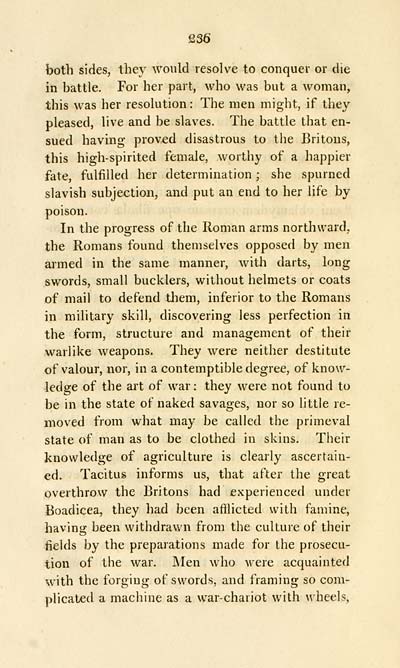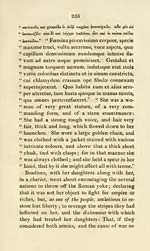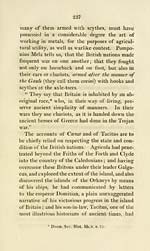Download files
Complete book:
Individual page:
Thumbnail gallery: Grid view | List view

Q36
both sides, tliey would resolv^e to conquer or die
in battle. For her part, who was but a woman,
this was her resolution : The men might, if they
pleased, live and be slaves. The battle that en-
sued having proved disastrous to the Britons,
this high-spirited female, worthy of a happier
fate, fulfilled her determination ; she spurned
slavish subjection, and put an end to her life by
poison.
In the progress of the Roman arms northward,
the Romans found themselves opposed by men
armed in the same manner, with darts, long
swords, small bucklers, without helmets or coats
of mail to defend tliem, inferior to the Romans
in military skill, discovering less perfection in
the form, structure and management of their
warlike weapons. They were neither destitute
of valour, nor, in a contemptible degree, of know-
ledge of the art of war : they were not found to
be in the state of naked savages, nor so little re-
moved from what may be called the primeval
state of man as to be clothed in skins. Their
knowledge of agriculture is clearly ascertain-
ed. Tacitus informs us, that after the great
overthrow the Britons had experienced under
Boadicea, they had been afflicted with famine,
having been withdrawn from the culture of their
fields by the preparations made for the prosecu-
tion of the war. ]\Ien who were acquainted
with the forging of swords, and framing so com-
plicated a machine as a war-chariot with wheels.
both sides, tliey would resolv^e to conquer or die
in battle. For her part, who was but a woman,
this was her resolution : The men might, if they
pleased, live and be slaves. The battle that en-
sued having proved disastrous to the Britons,
this high-spirited female, worthy of a happier
fate, fulfilled her determination ; she spurned
slavish subjection, and put an end to her life by
poison.
In the progress of the Roman arms northward,
the Romans found themselves opposed by men
armed in the same manner, with darts, long
swords, small bucklers, without helmets or coats
of mail to defend tliem, inferior to the Romans
in military skill, discovering less perfection in
the form, structure and management of their
warlike weapons. They were neither destitute
of valour, nor, in a contemptible degree, of know-
ledge of the art of war : they were not found to
be in the state of naked savages, nor so little re-
moved from what may be called the primeval
state of man as to be clothed in skins. Their
knowledge of agriculture is clearly ascertain-
ed. Tacitus informs us, that after the great
overthrow the Britons had experienced under
Boadicea, they had been afflicted with famine,
having been withdrawn from the culture of their
fields by the preparations made for the prosecu-
tion of the war. ]\Ien who were acquainted
with the forging of swords, and framing so com-
plicated a machine as a war-chariot with wheels.
Set display mode to: Large image | Transcription
Images and transcriptions on this page, including medium image downloads, may be used under the Creative Commons Attribution 4.0 International Licence unless otherwise stated. ![]()
| Early Gaelic Book Collections > Ossian Collection > Thoughts on the origin and descent of the Gael > (248) |
|---|
| Permanent URL | https://digital.nls.uk/82237420 |
|---|
| Description | Selected books from the Ossian Collection of 327 volumes, originally assembled by J. Norman Methven of Perth. Different editions and translations of James MacPherson's epic poem 'Ossian', some with a map of the 'Kingdom of Connor'. Also secondary material relating to Ossianic poetry and the Ossian controversy. |
|---|
| Description | Selected items from five 'Special and Named Printed Collections'. Includes books in Gaelic and other Celtic languages, works about the Gaels, their languages, literature, culture and history. |
|---|

